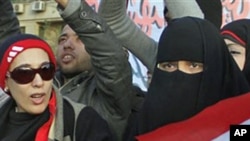Egypt's military says it recognizes the "legitimate demands" of the Egyptian people, and has pledged not to fire on protesters who are expected to fill central Cairo Tuesday for a "million-man march" on President Hosni Mubarak's palace.
A general strike also is called for Tuesday, and a second massive protest is planned in the northern port city of Alexandria.
National train services were cancelled Monday, in what some consider an attempt by authorities to prevent rural residents from joining the urban protests. An unprecedented Internet cutoff remained in place for a fifth day Tuesday.
The military statement comes as tens of thousands of Egyptians continue to protest in Cairo's Tahrir Square, defying the fifth night of a government-imposed curfew.
Slideshow of recent images from Egypt
|
Key Players in Egypt's Crisis
|
Egypt's newly appointed vice president said Mr. Mubarak has asked him to begin immediate discussions with all "political forces" on constitutional and legislative reforms. Omar Suleiman, a longtime confidant of Mr. Mubarak, did not say what the changes will entail or which groups the government will contact.
The Wall Street Journal newspaper reported that opposition parties say they will not negotiate as long as Mr. Mubarak remains in office.
A crisis committee from Egypt's newly formed opposition coalition met Monday to discuss their strategy in anticipation of Mr. Mubarak's ouster.
The gathering issued a call for Tuesday's escalated protests but did not reach a final agreement on a list of demands.
On Sunday, Egypt's powerful Muslim Brotherhood and the secular opposition said they had chosen prominent democracy advocate Mohamed ElBaradei to represent their side in possible negotiations with the army over Mr. Mubarak's departure.
The military's announcement, delivered on state television without elaboration, did not specify whether it considers legitimate the demands for Mr. Mubarak's removal or merely calls for reform.
Egypt's president named a new interior minister and finance minister Monday, in an apparent attempt to quell angry protesters. The foreign minister and long-serving defense minister kept their posts in the Cabinet reshuffle.
Retired General Mahmoud Wagdy will replace the widely reviled Habib Adly as the interior minister, overseeing the police and plainclothed domestic security forces. Many Egyptians have been calling for his firing after deadly clashes last week between police and demonstrators.
Police were back on the streets Monday, but security sources say they have orders to stick to regular work without confronting demonstrators.
More than 125 people have died during protest violence in the past week.
Looting that erupted over the past two days eased in Cairo. Egypt's army is continuing its increased presence, with tanks guarding banks and government buildings.
The military's central command has been meeting frequently during the past week to review intelligence on the political situation as well as what many see as a growing economic crisis from the continued unrest. Banks and the stock market are scheduled to remain closed for a second day Tuesday.
Israel, meanwhile, granted Egypt permission to move two battalions of soldiers into the Sinai Peninsula, which has been largely demilitarized since the two countries signed a peace treaty in 1979. The area is populated by Bedouin tribes that have posed a challenge to Egyptian authorities for years.
Mr. Mubarak ordered his new Cabinet Sunday to preserve subsidies, control inflation and provide more jobs. In a letter read on state television, the embattled president also stressed the need for political reform through dialogue with the country's opposition parties.
An unprecedented Internet cutoff remained in place for a fourth day Monday, an apparent move by the government to disrupt protest organizers.
Watch raw video from the streets of Egypt




